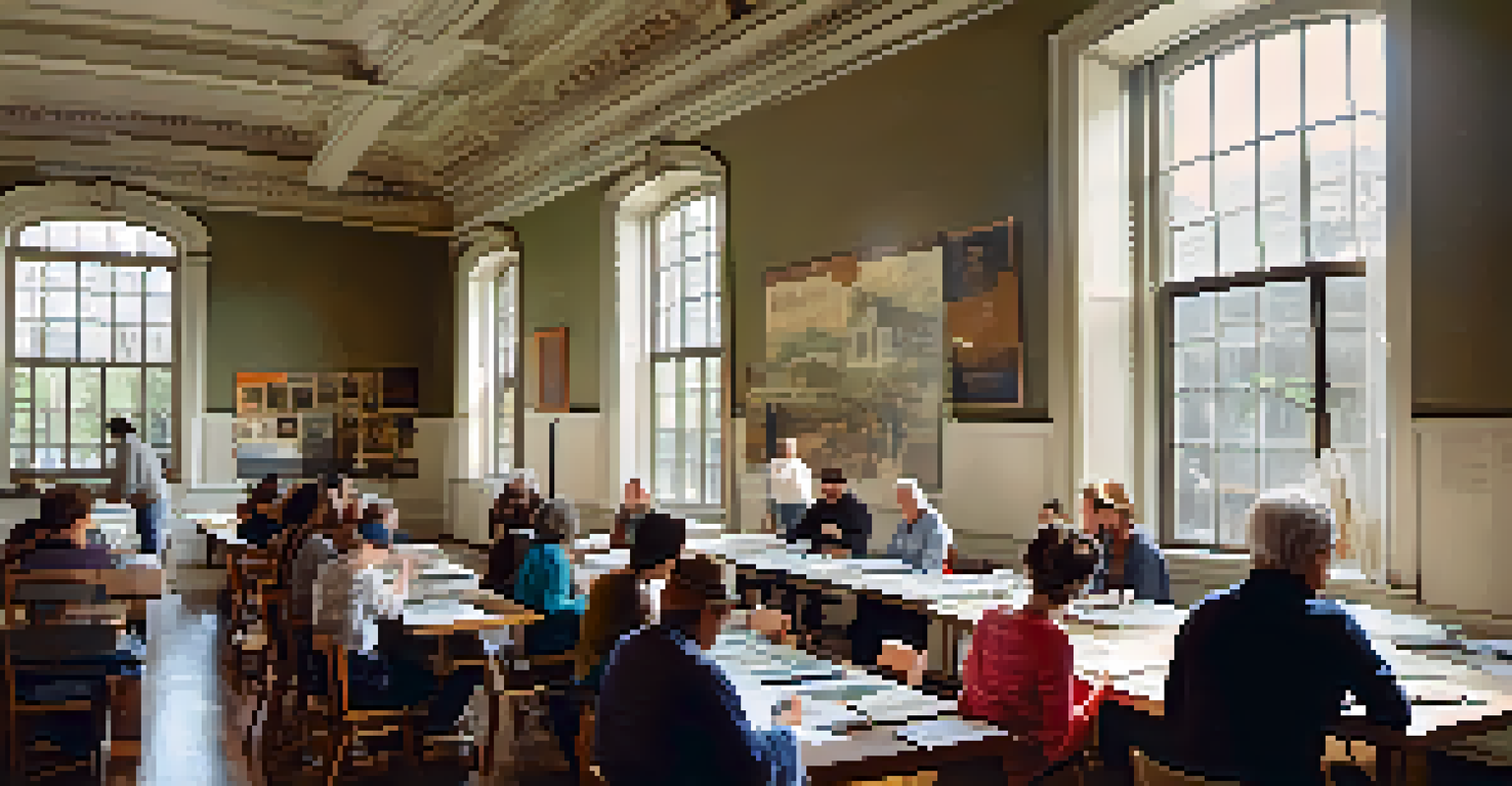Exploring Charlotte's Historic Preservation Organizations Today

The Importance of Historic Preservation in Charlotte
Charlotte's rich history is woven into its architecture, neighborhoods, and cultural landmarks. Preserving these elements is crucial not only for maintaining the city's identity but also for fostering community pride. Historic preservation helps to tell the story of Charlotte, connecting residents to their past and enriching the urban landscape.
Preservation of our heritage is not just about the past; it's about our future and the legacy we leave for generations to come.
Moreover, preserving historic sites can contribute to economic growth. These sites often attract tourists and can increase property values in surrounding areas. By maintaining the character of neighborhoods, historic preservation organizations help create vibrant, attractive environments that benefit both residents and businesses.
In a fast-paced world, historic preservation serves as a reminder of where we come from. It creates a sense of continuity and belonging while encouraging responsible development. Charlotte's historic preservation efforts ensure that future generations can appreciate and learn from the city's unique heritage.
Key Organizations Leading the Charge
Several organizations play pivotal roles in Charlotte's historic preservation efforts. The Charlotte-Mecklenburg Historic Landmarks Commission is at the forefront, working to identify and protect significant sites throughout the region. Their dedication to preserving local history is evident in their various initiatives and community outreach programs.

Another important player is the Historic Charlotte organization, which focuses on education and advocacy. By raising awareness about the importance of preserving historic structures, they encourage community involvement and support for preservation efforts. Their events and educational resources help residents understand the value of their architectural heritage.
Preservation Shapes Community Identity
Historic preservation fosters community pride and connects residents to their past.
Additionally, the National Trust for Historic Preservation lends its expertise and resources to support local initiatives in Charlotte. Their nationwide network provides valuable insights and funding opportunities, helping local organizations amplify their impact and reach. Together, these organizations form a robust framework for preserving Charlotte's history.
Community Engagement in Preservation Efforts
Community involvement is vital for successful historic preservation. Local residents are often the most passionate advocates for preserving their neighborhoods, as they have a personal stake in their history. By participating in preservation efforts, community members can ensure their voices are heard and their stories are told.
Historic preservation is a catalyst for economic development, community revitalization, and sustainable growth.
Organizations like Historic Charlotte actively encourage public engagement through workshops, volunteer opportunities, and events. These initiatives not only educate residents about the significance of their local history but also foster a sense of ownership and responsibility. When people feel connected to their heritage, they are more likely to support preservation initiatives.
Moreover, collaboration with local governments enhances community engagement. By partnering with city officials, preservation organizations can advocate for policies that protect historic sites. This collaboration creates a unified approach to preservation, benefitting both the community and the city as a whole.
Challenges Facing Historic Preservation Today
Despite the dedication of various organizations, historic preservation in Charlotte faces significant challenges. Rapid development and urbanization often threaten historic sites, as new construction projects can overlook the importance of preserving local heritage. This clash between growth and preservation creates tension within communities.
Funding is another major hurdle. Many historic preservation projects rely heavily on grants and donations, which can be unpredictable. Limited financial resources can hinder the ability of organizations to maintain and restore historic properties, making it difficult to achieve long-term preservation goals.
Economic Benefits of Preservation
Maintaining historic sites not only enhances property values but also attracts tourism.
Additionally, public awareness is crucial for overcoming these challenges. Many residents may not fully understand the importance of preserving their local history. By educating the community and highlighting successful preservation stories, organizations can build support and foster a culture of preservation that values the past.
Spotlight on Successful Preservation Projects
Charlotte boasts several successful historic preservation projects that serve as shining examples of what can be achieved. The restoration of the historic Latta Plantation is a prime case, where efforts have been made to preserve not only the structure but also the surrounding landscape and heritage. This project has become a valuable educational resource for the community.
Another noteworthy project is the preservation of the historic Fourth Ward neighborhood, which has transformed over the years into a vibrant residential area. By maintaining its historic charm while accommodating modern needs, the Fourth Ward showcases how preservation and development can coexist harmoniously.
These success stories highlight the potential for future preservation projects in Charlotte. They serve as inspiration for both organizations and community members, illustrating that with dedication, collaboration, and creativity, historic preservation can flourish even in a rapidly changing urban environment.
The Role of Education in Preservation
Education plays a crucial role in historic preservation efforts in Charlotte. It empowers residents with knowledge about their local history, emphasizing the importance of preserving cultural heritage. Schools and community organizations often collaborate to create programs that educate both children and adults about the significance of their surroundings.
Workshops, tours, and lectures organized by preservation organizations provide opportunities for the community to engage directly with their history. These events not only raise awareness but also inspire individuals to take action and participate in preservation initiatives. Understanding the stories behind historic sites can ignite a passion for preservation.
Education Drives Preservation Efforts
Educational initiatives empower residents to engage with and advocate for their local history.
Additionally, educational programs can equip future generations with the tools needed to advocate for preservation. By fostering a sense of responsibility and connection to their heritage, Charlotte's youth can become the next generation of preservationists. This cycle of education and engagement is vital for sustaining preservation efforts in the long run.
The Future of Historic Preservation in Charlotte
Looking ahead, the future of historic preservation in Charlotte is both promising and challenging. As the city continues to grow, there will be ongoing debates about balancing development with preserving the past. However, the commitment of local organizations and community members provides hope for maintaining Charlotte's rich history.
Innovative approaches to preservation, such as adaptive reuse, are gaining traction. By repurposing historic buildings for modern uses, communities can preserve their heritage while meeting contemporary needs. This strategy demonstrates that preservation doesn't mean stagnation; it can be a dynamic process that embraces change while honoring the past.

Ultimately, the future of historic preservation in Charlotte will depend on collaboration, education, and community engagement. By fostering a culture that values history and promotes preservation, Charlotte can ensure that its unique heritage remains a vital part of its identity for generations to come.